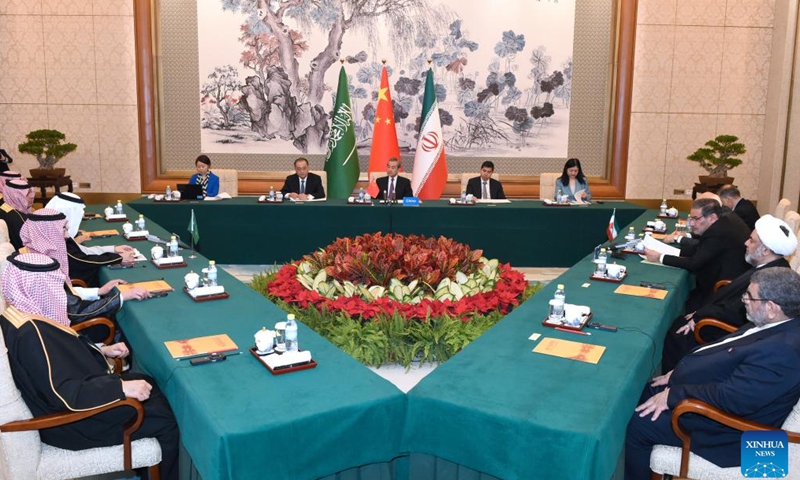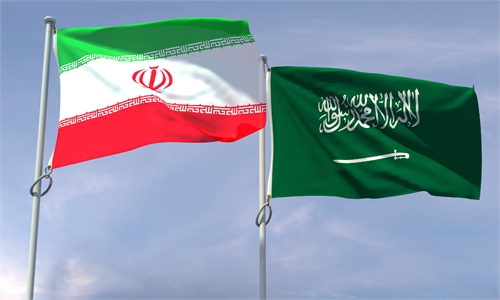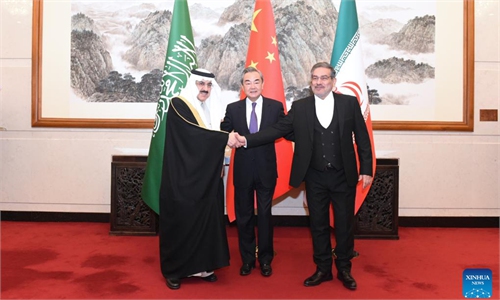OPINION / GLOBAL MINDS
While China maps out strategy, the US is overleveraging and overdrawing its strength

Wang Yi, a member of the Political Bureau of the Communist Party of China (CPC) Central Committee and director of the Office of the Foreign Affairs Commission of the CPC Central Committee, presides over the closing meeting of the talks between a Saudi delegation and an Iranian delegation in Beijing, capital of China, March 10, 2023.(Photo:Xinhua)
China, Saudi Arabia and Iran on Friday unexpectedly announced that Saudi Arabia and Iran will resume diplomatic ties. Mark Dubowitz, CEO of Foundation for Defense of Democracies, described China's successful mediation as "lose, lose, lose for American interests." He added that it demonstrates that the Saudis don't trust Washington to have their back, that Iran sees an opportunity to end its international isolation and that China is becoming the major-domo of Middle Eastern power politics."According to Associated Press, the White House "bristled at" the notion a Saudi-Iran agreement in Beijing suggests a rise of Chinese influence in the Mideast. National Security Council spokesman John Kirby was quoted as saying that "I would stridently push back on this idea that we're stepping back in the Middle East — far from it." However, this news has explosive geopolitical implications and is seen by many as a blow to US political credibility, while also being a significant achievement for China on the international political stage.
Also in these past few days, the collapse of Silicon Valley Bank (SVB) has become a shocking financial event. People are worried that the Federal Reserve's aggressive interest rate hikes are putting immense pressure on the fragile and complex arbitrage system in the US, and what happened to SVB is just the beginning, which will have its own following consequences, exposing some first signs of systemic risks.
While the US has real strength, however, its real strength has been overly leveraged. Driven by greed, the pursuit of profit has gone too far that in certain areas, the unsustainable Ponzi schemes are bound to blow up. This is true for finance, as well as politics.
Look at the chessboard of the international politics that the US engages in. It resembles a weak structure that is overleveraged. Relying on its super military power, the US imposes sanctions as a lever all over the world based on its high-tech, financial hegemony and market access. However, the capacity of these tools is limited. They are quite effective when used within a certain range, but abusing them will result in overdraw, eventually leading to failure.
Roughly 25 countries are now under various sanctions imposed by the US. China's economic size is now almost on par with that of the US. However, there are 639 Chinese entities on the US Commerce Department's entity list. The US has many enemies in the world and treats multiple powerful forces in a hostile or semi-hostile manner. It intervenes in affairs all over the world, attempting to dominate them. Its desire for intervention is like ten fingers pressing ten buttons, and it is severely fatigued. Its power and credibility have been severely overdrawn, and a loss of control is destined to occur.
China is completely different from the US, and the way China influences the world is through doing business and cooperation. Our own production capacity and market size continue to expand, and in this process, we connect with one market after another around the world. We do not rely on gunboat diplomacy or try to dictate anyone, our only law is win-win, with mutual respect and cooperation for mutual benefit. China's diplomatic approach is very attractive, so like a snowball, our business partners keep growing, and our overall strength and credibility naturally expand.
Who really wants to go to war in the world? Even those who are currently at war get tired of it at times. The US is pushing countries in hot spot areas to fight, fight harder, and never stop fighting. China tells these countries that fighting cannot solve the problem, and negotiation and compromise are good for everyone. As China's influence in the world grows, some countries may stop blindly following the US's instigations and instead try China's approach. China is now the largest or one of the largest buyers of Saudi and Iranian oil, and it only has one logistic hub in Djibouti in the Middle East, with no real military bases. The headquarters of the US Fifth Fleet is in Bahrain in the Gulf, and Israel is its staunch ally in the Middle East. Many countries' air forces use American fighter jet F-16s, and oil trade is priced in US dollars.
China's "only link" with Middle Eastern countries is business, and its "comprehensive presence" in the Middle East is obviously not as strong as the US'. However, business is the fundamental basis for the stability of all countries. Those countries that want to go to war will not look to China first, but when they are tired of war and want peace and stability, and the US has a complex attitude, they will increasingly look to China. China and Saudi Arabia, as well as China and Iran are first and foremost good friends bound together by commercial interests. China is the only major power in the world with such a solid relationship with these two countries. This is how China's accumulated strength facilitated the Saudi-Iran deal.
Looking at the world, China maintains friendly relations with both sides of conflicts in the most tense geopolitical frontlines. China is a strategic partner with both Russia and Ukraine, and we maintain friendly relations with both North and South Korea on the Korean peninsula. In these regions, the US is always pushing one side to fight the other, as it does between Saudi Arabia and Iran. These are the two different approaches of international politics.
The US' approach weakens its enemies but also weakens itself, or it distorts itself. China's approach is to develop itself healthily, to talk about cooperation with every country, and to influence the world with our peaceful and cooperative ideas. Countries including the US are all our important business partners, and China is the largest trading partner of almost all of America's Asia-Pacific allies. China doesn't target any specific country. Maintaining strong momentum of self-development is its reply to various anti-China forces. Let the US continue to use various levers, which will eventually break at certain tipping point due to overuse. China, pragmatic and down to earth, can map out a strategy well.
The author is a commentator of the Global Times. opinion@globaltimes.com.cn



